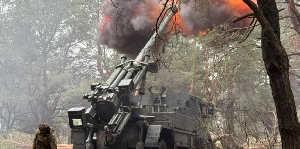The prices of crude oil increased to $75 per barrel after Iran attack on Israel, which analysts said has raised the supply risks.
Energy costs tighten further in early European trading on growing fears of a full-scale regional war in the Middle East that could potentially disrupt supplies.
Brent climbed $75.13 a barrel, while WTI rose to $71.45 a barrel. Both benchmarks climbed as much as 5% in the previous trading session following Iran’s missile attack on Israel in retaliation for the killing of Hezbollah’s leader last week.
“The key uncertainty now is how Israel will respond,” ING commodities strategists said in a note.
"…Significant escalation would likely involve targeting Iranian nuclear facilities and energy infrastructure, which would likely boost the risk premium priced into the oil market.”
Oil prices rallied yesterday, and this strength has continued in early morning trading today. ICE Brent settled almost 2.5% higher yesterday. The attack appears to have been largely ineffective, with Israel’s iron dome intercepting the majority of missiles.
While Iran has said it has concluded its actions, the market is more concerned about how Israel will now respond, something it has promised to do, ING said, adding that the more Iran gets directly involved in the oil market, the greater the risk of seeing actual supply disruptions.
Given developments though, the price action still seems fairly modest, ING stated further, noting that this likely reflects the fact that the market has become increasingly numb to developments in the Middle East, which have dragged on for almost a year. However, actual supply disruptions would change this.
The key uncertainty now is how Israel will respond. Back in April, the Israeli response to an Iranian missile and drone attack was targeted and measured with an airbase hit.
There are several routes Israel could take this time. It could take similar action to April and target military infrastructure, possibly the launch sites for the recent missile attack.
Significant escalation would likely involve targeting Iranian nuclear facilities and energy infrastructure, which would likely boost the risk premium priced into the oil market.
The US will likely try to push Israel for a more modest response, wanting to avoid a significant escalation in tensions.
Moving on, preliminary OPEC production numbers for September are starting to come through. Bloomberg’s OPEC survey shows that the group’s production fell by 480k b/d month on month to 26.61m b/d.
This reduction was largely driven by Libya where a dispute between the Tripoli-based government and the eastern-based government led to oil production being shut-in.
However, with the eastern government having now approved the governor of the central bank, supply is set to recover.
Numbers overnight from the API showed that US crude oil inventories fell by 1.5m barrels over the last week, roughly in line with market expectations.
Meanwhile, gasoline stocks increased by 900k barrels, while distillate stocks fell by 2.7m barrels over the week. The more widely followed EIA report will be released later today.
OPEC+ will also hold its Joint Ministerial Monitoring Committee (JMMC) meeting today.
Given that a handful of OPEC+ members previously agreed to continue with their full additional voluntary cuts until the end of November, analysts do not expect the committee to recommend any change to output policy.
Watch the latest edition of BizTech below:
Ghana’s leading digital news platform, GhanaWeb, in conjunction with the Korle-Bu Teaching Hospital, is embarking on an aggressive campaign which is geared towards ensuring that parliament passes comprehensive legislation to guide organ harvesting, organ donation, and organ transplantation in the country.
Click here to follow the GhanaWeb Business WhatsApp channel
Business News of Wednesday, 2 October 2024
Source: dmarketforces.com













